イベント&アクティビティ
DIJ Study Group on Post-Fukushima Literature
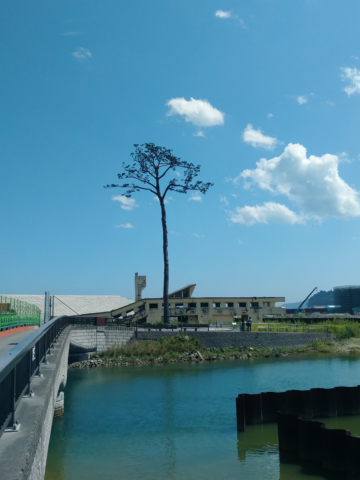
This talk will explore the political stakes of modes of seeing and remembering through the lenses of proximity and transparency, while proposing a possible reevaluation of these concepts in the light of the Fukushima Daiichi nuclear disaster. Radiation upsets spatial hierarchies and visual regimes by posing its own questions on positionality and representation. A tentative answer to such queries might come from a careful consideration of recent directions in scholarship in new materialism and ecocriticism, and in the form of a kind of ‘radioactive aesthetic’. Thanks to its poetics of avisuality and distance, radioactive aesthetic often attracts into its orbit literary works apparently removed from the catastrophe, thus proposing a corrective to the criteria of authority and proximity implicit in the process of canonization of works of ‘post-Fukushima literature’ and of disaster literature in general. Details and registration here
Speaker:
Chiara Pavone, University of California, Los Angeles
DIJ Study Group ‘Visions and Expectations of Autonomous Driving’
 There are many innovation efforts in the field of mobility such as autonomous driving or ‘mobility as a service’ in Japan today. Expectations and visions play a significant role for the direction of innovations: future-oriented narratives and imaginaries mobilize interests and financial resources, stimulate agenda setting, and facilitate actor coordination. In the process of being shared by different actors, expectations can transform into binding requirements, or into self-evident assumptions providing orientation for future actions. This presentation explores the substance of governmental visions and expectations of autonomous driving in Japan by examining government policy documents and archival records. These visions include the performance of envisioned technologies that have yet to be realized and wider socio-technical transitions. However, such visions also entail the risk of policy makers becoming locked in a single pattern while overlooking alternative solutions. Details and registration here
There are many innovation efforts in the field of mobility such as autonomous driving or ‘mobility as a service’ in Japan today. Expectations and visions play a significant role for the direction of innovations: future-oriented narratives and imaginaries mobilize interests and financial resources, stimulate agenda setting, and facilitate actor coordination. In the process of being shared by different actors, expectations can transform into binding requirements, or into self-evident assumptions providing orientation for future actions. This presentation explores the substance of governmental visions and expectations of autonomous driving in Japan by examining government policy documents and archival records. These visions include the performance of envisioned technologies that have yet to be realized and wider socio-technical transitions. However, such visions also entail the risk of policy makers becoming locked in a single pattern while overlooking alternative solutions. Details and registration here
Speaker:
Yukari Yamasaki, Karlsruhe Institute of Technology
Online conference ‘Climate Change, Energy, and Sustainability in the Pacific Region’

Please note: Panel 5 was moved to Friday, April 23, 11:30 a.m. JST / Warsaw 4:30 a.m. / Eugene, OR 7:30 p.m. (Thursday, April 22)
The DIJ will host the four-day online conference ‘Climate Change, Energy, and Sustainability in the Pacific Region Knowledge, Policies, and Transfers (1970s – Present)’ from April 19 to 23. It seeks to explore the historical development of attitudes towards climate change and environmental degradation within various Pacific Rim countries like China, the United States, the Soviet Union/Russia, Japan, South Korea, Australia, Canada, and Mexico. It will also address interactions between their climate, energy, and environmental policies and ask which national economic goals, geopolitical rivalries, social structures, and cultural preferences pose obstacles to the implementation of countermeasures to climate change and environmental degradation. The conference is part of the Max Weber Foundation’s collaborative research project “Knowledge Unbound” in the module “Interaction and Knowledge in the Pacific Region: Entanglements and Disentanglements”, funded by the Federal Ministry of Education and Research (Germany). Details and registration here
書籍共同展示「3.11から10年」
DIJ researchers at virtual AAS 2021 Annual Conference
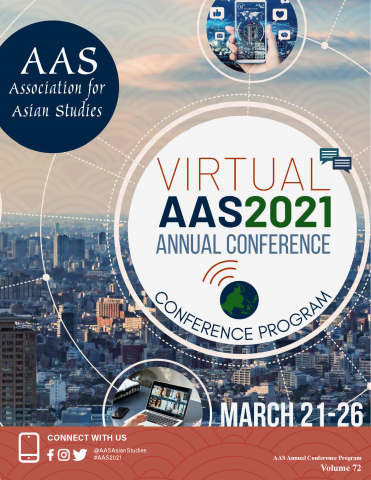
DIJ social scientists Sonja Ganseforth and Nora Kottmann have presented papers on their current research projects at this year’s virtual AAS annual conference. Sonja’s paper “The Political Ecology of Japanese Coastal Fisheries Reform” draws on her research project Fishing communities between growth and demise and studies challenges faced by Japanese coastal fisheries after recent legal reforms. Nora gave her paper “Negotiating Belonging: German Expatriates in Southern Tokyo” in the panel ‘Managing Migration in Japan: Short-term Labour, Tourists, and International Students’. Her paper is based on ongoing fieldwork and analyzes different conceptions of belonging among privileged, highly mobile short-term migrants. DIJ alumna Gabriele Vogt served as discussant in this panel. The AAS presentations are available as on-demand videos. More information here.
VSJF Annual Conference ‘Continuity and Change 10 years after 3.11’
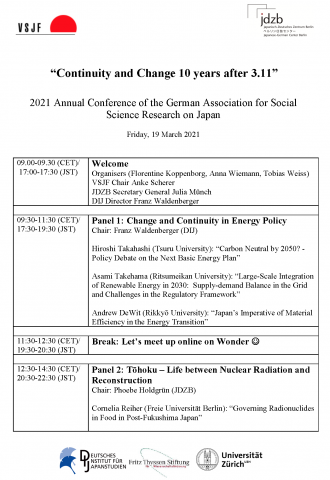 The DIJ is cooperation partner of the 2021 Annual Conference of the German Association for Social Science Research on Japan (VSJF), organized by DIJ alumni Anna Wiemann and Tobias Weiss together with Florentine Koppenborg. The one-day online conference ‘Continuity and Change 10 years after 3.11’ takes place on Friday, 19 March 17-25h (JST)/9-17h (CET). It features panels on ‘Change and Continuity in Energy Policy’, ‘Tōhoku – Life between Nuclear Radiation and Reconstruction’, and ‘Civil Society and the State since 3.11’. Participants include the DIJ’s director Franz Waldenberger, principal researcher Isaac Gagné, and DIJ alumna Phoebe Holdgrün. Isaac will present the paper “Haunting Memories of 3.11 and the Heaviness of Trauma in Post-Disaster Miyagi” which is part of his ongoing research project Listening to the Community: Grassroots Mental Healthcare in Local Communities. The conference is organized by the Japanese-German Center Berlin (JDZB) and the VSJF, in cooperation with the DIJ and supported by the Fritz Thyssen Stiftung and the Universität Zürich. Details, programme, and registration link here.
The DIJ is cooperation partner of the 2021 Annual Conference of the German Association for Social Science Research on Japan (VSJF), organized by DIJ alumni Anna Wiemann and Tobias Weiss together with Florentine Koppenborg. The one-day online conference ‘Continuity and Change 10 years after 3.11’ takes place on Friday, 19 March 17-25h (JST)/9-17h (CET). It features panels on ‘Change and Continuity in Energy Policy’, ‘Tōhoku – Life between Nuclear Radiation and Reconstruction’, and ‘Civil Society and the State since 3.11’. Participants include the DIJ’s director Franz Waldenberger, principal researcher Isaac Gagné, and DIJ alumna Phoebe Holdgrün. Isaac will present the paper “Haunting Memories of 3.11 and the Heaviness of Trauma in Post-Disaster Miyagi” which is part of his ongoing research project Listening to the Community: Grassroots Mental Healthcare in Local Communities. The conference is organized by the Japanese-German Center Berlin (JDZB) and the VSJF, in cooperation with the DIJ and supported by the Fritz Thyssen Stiftung and the Universität Zürich. Details, programme, and registration link here.
Virtual lecture on ‘Love in the Time of COVID-19’
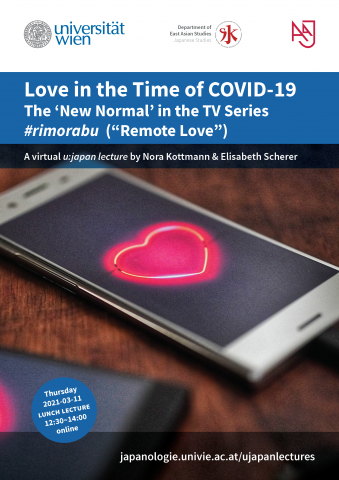
DIJ researcher Nora Kottmann and DIJ alumna Elisabeth Scherer (Heinrich Heine University Düsseldorf) will be the next speakers in the virtual lecture series at the University of Vienna’s Japanese Studies programme. Their presentation “Love in the Time of COVID-19. The ‘New Normal’ in the TV Series #rimorabu (‘Remote Love’)” focuses on the television series #rimorabu. Futsū no koi wa jadō which aired from October to December 2020 on NTV. The series is situated in the context of the ongoing pandemic and discusses how calls for self-restraint and the avoidance of ‘the 3Cs’ – closed spaces, crowds and close contact situations – affect the dating- and love-life of unmarried individuals. The presentation will address challenges on the production side and critically discuss depictions of a ‘new normal’ in the context of current single- and gender-discourses in Japan. More information on this talk and link to register here.
DIJ research presentation at ISA Forum of Sociology
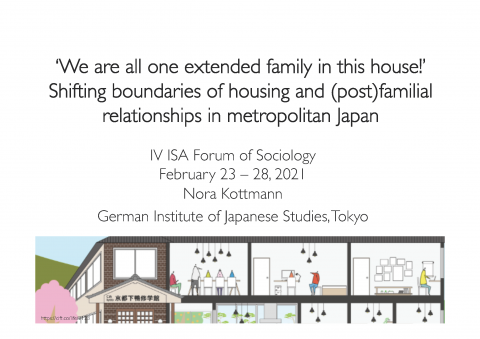
DIJ senior research fellow Nora Kottmann presented her paper “‘We Are All One Extended Family in This House!’ Shifting Boundaries of Housing and ‘(Post)Familial’ Relationships in Japan” at the virtual IV ISA Forum of Sociology on February 26, 2021. Her presentation was part of the panel “From the Changing Idea of ‘the Family’ to a Shifting Notion of Home?” which examined practices of doing family and home with foci on the temporal, spatial, material, and affective aspects of everyday life. Based on qualitative data from an ongoing field study in Tokyo, Nora’s paper addressed the interrelation of housing and ‘(post)familial’ relationships and the perception of dwelling spaces with regard to understandings of ‘family’. Her findings reveal that housing is highly interrelated with various ‘(post)familial’ relationships and that ‘new’ spaces are actively created and done by people living ‘new’ or rather unconventional relationships. Nora’s presentation was part of her ongoing research project on Spatial Perspectives on Personal Relationships in Contemporary Japan.






 Open Access
Open Access
